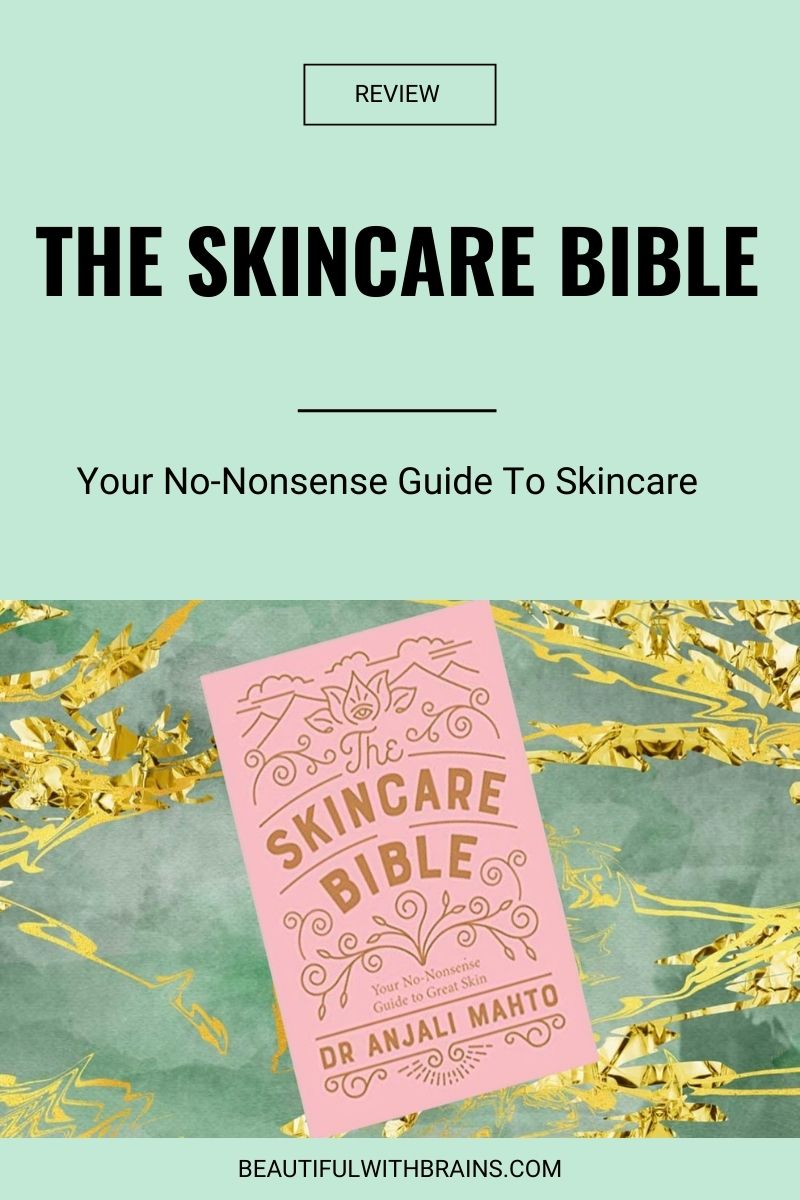
Hands up if skincare confuses the heck out of you.
Is it enough to just cleanse, tone, moisturise or do you need 10+ steps like the Koreans do?
Chemical or physical exfoliation? Antioxidants or retinoids? And what about peptides and hyaluronic acid? How the heck do you fit all this stuff into your skincare routine?!
Sometimes, it feels like you need a PhD in cosmetic science just to buy a moisturiser… 🙄
Save the hassle and get yourself a copy of The Skincare Bible by Anjali Mahto. This short book cuts through all the marketing bullshit and tells you all you really need to know about skincare:
1. The Advice Is Science-Based
Mahto is a consultant dermatologist, so you can trust her advice is based in science, not hype. She had the idea for the book from her patients: she saw how much money, time, and effort they wasted on crap that doesn’t work.
Blame it on blogs and Instagram. Don’t get me wrong, I love them. But for every influencer who knows what she’s talking about (love you, Michelle from LabMuffin!), there are 10 who promote whatever they’re paid to promote. And don’t get me started on magazines…
Everything looks amazing. Everything is a must. You feel like your skin is missing out on some miraculous ingredient if you don’t use them all, but when you do, your skin doesn’t get any better… So frustrating!
Mahto takes a look at what the science says about the IT skincare ingredients of the moment, from retinol to peptides to epidermal growth factors, to reveal what really works and what’s just hype.
No more wasting time on stuff that doesn’t work. Next time you go skincare shopping at Sephora, you’ll know straight away what product to grab off the shelf.
P.S. Don’t be fooled by the word science. The Skincare Bible isn’t a boring academic book. Mahto writes in a chatty way that’s fun and easy-to-follow.
Related: The Complete Guide To Growth Factors: What Are They + Are They Safe?
2. The Skincare Routines Are Short
Is it me or does it take half an hour to do your skincare routine these days?
Cleanse, tone, moisturize. Put on your sunscreen. Don’t forget to exfoliate. Wait, have you applied an antioxidant serum? And a hyaluronic acid one? Here’s an essence, too.
It’s too much. Mahto wants us to go back to basics. And I couldn’t agree more with her. Like I always say, it’s not about using ALL the ingredients. It’s about using the ingredients your skin needs.
And your skin doesn’t really need that many. In The Skincare Bible, Mahto shares her skincare routines for all skin types and they’re super short. Between 3 to 5 steps. Each. And a few are optional.
Related: My Skincare Routine
3. All Your Skincare Questions, Answered
Want to know when you should use retinol? When a blood test is useful to treat acne? Or how to find the best doctor to treat your acne scars?
Llet’s be honest here. Serums and moisturisers can’t solve all your skincare problems. You need to know when to go to a dermalogist – and how to find a good one.
The Skincare Bible has you covered. It answers any skincare question you may have about any skincare problem. And more.
It delves into nutrition so you know what to eat for great skin. Helps you create the right lifestyle habits to support your skincare routine. And deal with hormones when they make your skin act crazy.
Related: I Went On The Low Glycemic Diet And It Transformed My Skin
If you’re tired of falling for the hype and just want a simple skincare routine that works, get yourself a copy of The Skincare Bible by Anjali Mahto.
I can’t recommend it enough.

I clicked on this all excited because I thought you were saying you’d published your own book. The second you publish one, I’ll be on board. 🙂
E, aww you’re so sweet! I’m’ writing one, hope to publish it next year. In the meantime, this one is good too. 🙂
I purchased and read the book. The advice is consistent with your posts except for oils. Dr. Mahto is not a fan of cleansing oils and facial oils. What are your thoughts?
Trish,
I’ve noticed a lot of derms don’t like oils. Sam Bunting explained in one of her Youtube videos that’s because they see a lot of patients with acne/oily skin and most oils worsen these problems.
I think oils are great for the right skin type, i.e. dry. For everyone else, they can be problematic. A lot of oils contain fragrance and they’re a no-no for sensitive skin. Others can aggravate fungal acne or cause breakouts and are a no-no for oily and acne-prone skin.
If you’re into natural skincare and have sensitive/oily/acne-prone skin, you need to do your research to identify the few oils you can use and spend a little extra money to make sure they’re 100% pure with no additives that can cause problems.
In the end, I don’t think oils themselves are the problem. It’s the hype around oils that’s the problems. So many magazines/influencers/shop assistants tout them as miracle workers for all skin types, making you think you’re missing out if you don’t use them. And that only leads to people buying the wrong products for their skin. 🙁
Yes! I’ve been eating up your posts and love them all but would really appreciate a book on this subject. Thanks for the recommendation!
Heidi, I’m working on it. Thanks for the support. 🙂 In the meantime, this is a great read. We share a lot of the same opinions on skincare.